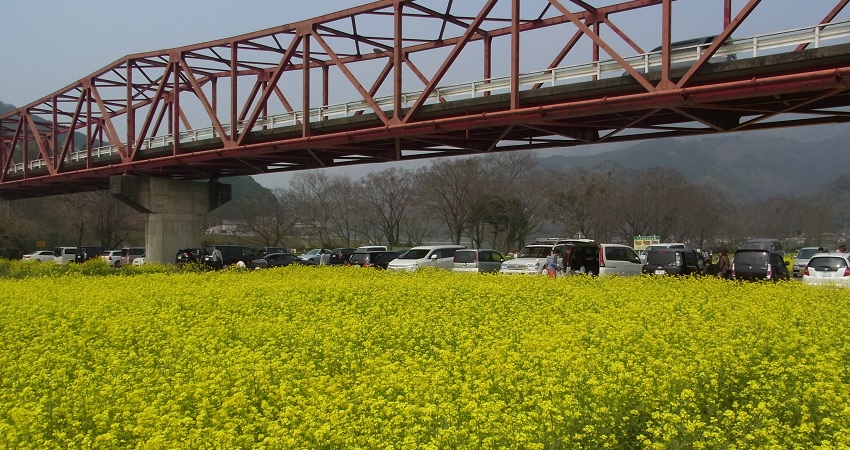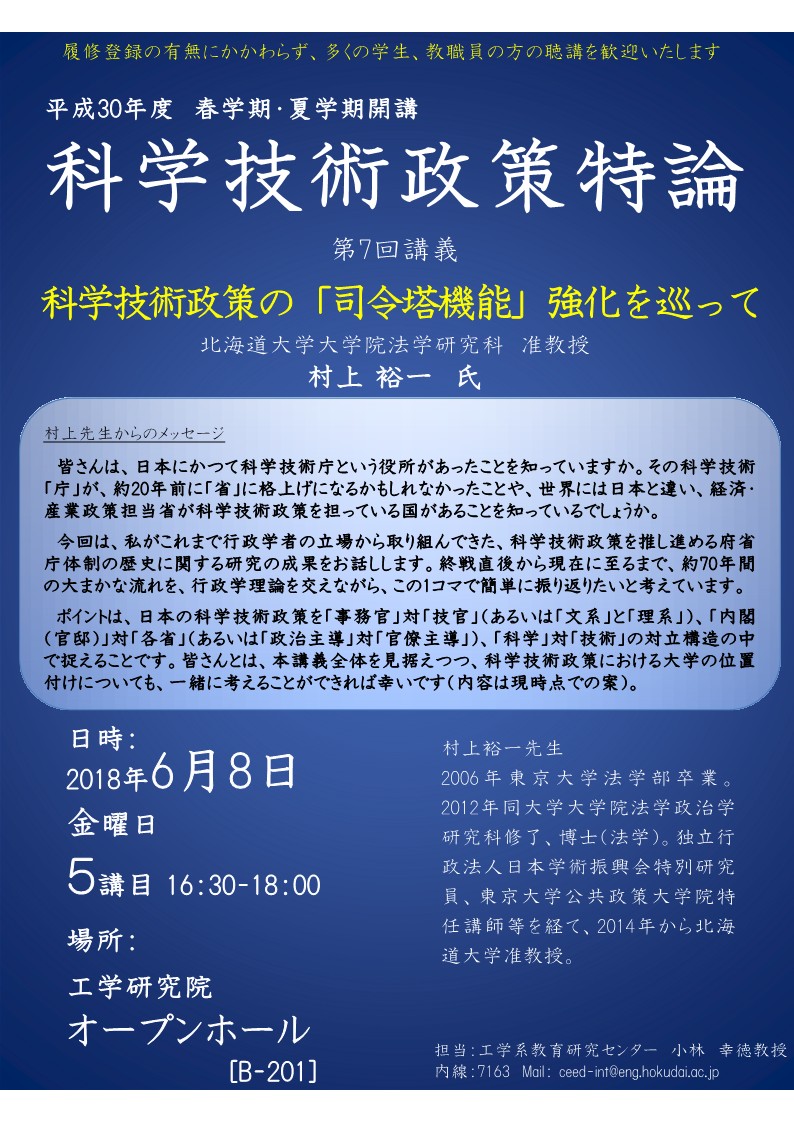
※ オフィスアワーは【1学期】毎週金曜日 15~16時(事前にメールで連絡をください)。
※ 技術政策学、行政学、演習Ⅱ、科学技術政策特論
1.公共政策大学院「技術政策学」(1学期:月3)
※ 石川達也先生、鈴木一人先生と共同
●キーワード Key Words
・科学技術、テクノロジー・アセスメント、国土開発、環境技術、宇宙政策、原子力安全、エネルギー政策、自然再生エネルギー、海洋政策、沿岸防災政策、沿岸総合管理、インフラ整備、安全規制、技術基準
●授業の目標 Course Objectives
・文理融合型の公共政策大学院において、多様なバックグラウンドを持つ学生に対し、技術と公共政策の関係を学び、文系・理系の双方から公共政策上の課題に取り組み、問題解決能力を身につけることを目標とする。
●到達目標 Course Goals
・技術が公共政策にどのように貢献し、活用されているかを見るだけでなく、政治学・経済学的な観点から技術をどのように発展させ、活用して公共政策上の問題を解決していくのかを理解することを到達目標とする。
●授業計画 Course Schedule
・本講義では、公共政策における技術の位置づけと役割を明らかにし、技術政策を進める上でどのような要因が政策決定に影響し、またどのような技術革新が政策のあり方に変化を与えていったのかについて議論する。そのために、本講義では、まず技術政策や科学技術ガバナンスのあり方を理解するために必要な歴史的・制度的知識と分析枠組みを提示する。その上で、下記のような具体的な事例やテーマを取り上げて検討する。
① 科学技術政策決定過程:国家が科学技術政策を決定する上で、いかなる論理と権力構造に基づいて政策決定を行うのかについて
② 巨大科学技術政策:国家が主導する技術開発分野である宇宙開発や原子力などの巨大科学技術について
③ 科学技術と安全保障:軍民両用技術(デュアルユース)の問題と技術拡散による安全保障の不安定化の問題について
④ 環境技術政策:環境問題が大きな問題となっている中で、再生エネルギー技術の開発やグリーン・イノベーションといった技術が公共政策に与える影響について
⑤ インフラ整備政策:公共政策の中核に位置するインフラ整備における技術革新がもたらす、公共政策上の問題解決について
⑥ 北海道開発政策:厳しい気候と環境の中で、北海道開発を進めるに当たり、どのような技術が用いられ、どのように問題解決がなされていったのかについて
⑦ 先進技術の導入・普及政策:燃料電池自動車等の先進技術を社会に導入し普及させるに当たり、近年、中央・地方においていかなる動きが見られるかについて
⑧ 安全規制政策:私たちにとって身近な製品の技術基準がどのように策定され、安全規制が実施されているか。その仕組みとプロセスについて
●準備学習(予習・復習)等の内容と分量 Homework
・各テーマで事前に配布される資料を通読し、これに関する知識を事前に修得しておく。講義の内容を理解し、授業で報告を求める。講義への理解度などを確認するために、それぞれの担当者ごとに中間レポートを課し、期末に全ての講義を踏まえたレポート提出を求める。
●成績評価の基準と方法 Grading System
・各担当教員が提示する課題(レポート、発表会でのプレゼンテーションや討議等)を各担当教員が評価する。また学期末にレポートを課す。成績評価の基準は以下の通り。
①技術政策学に関する基礎的な概念を理解している・・・可
②①に加え、事例にあてはめて説明することができる・・・良
③②に加え、具体的事例を対象に技術評価、政策分析をすることができる・・・優
④③のレベルにおいて特に優れている・・・秀
●テキスト・教科書 Textbooks
・本演習の内容を網羅するテキスト・教科書はない。参考文献のリストは演習の中で配付する。
●講義指定図書 Reading List
・参考文献のリストは演習の中で配付する。
●参照ホームページ Websites
・http://lex.juris.hokudai.ac.jp/~yuichim/education2018.html#link1

2.法学部「行政学」(1学期:火4・金3) ※ 文学部「政治学(行政学)」と合併
●キーワード Key Words
・官僚制、行政制度、行政組織、行政活動、公共政策
●授業の目標 Course Objectives
・現代国家における行政の構造と機能について、様々な行政の制度、行政官僚制の特質、そして行政活動のメカニズムに焦点を当てつつ、意思決定論・組織管理論・政策分析論等の観点から考察する。
・また、政策の立案・執行・評価の各局面において生ずる課題、及び政策の実現を左右する要因についても検討する。
●到達目標 Course Goals
(1) 行政(学)の基礎と全体像を、その過去・現在・未来、制度・組織・活動の観点から、理論的・実践的に理解し捉えることができる。
(2) 現代日本の行政の特質を、歴史的な観点や国際比較の観点から捉えることができる。
(3) 現代行政の課題とその解決の方向性について、主体的かつ現実的に考えることができる。
●授業計画 Course Schedule
行政学は、現代国家における行政の構造と機能について、行政を構成する3要素、すなわち、
①国民からの付託により行政組織が位置付けられ、活動の前提となる枠組みを形作っている「制度」、
②行政活動を行う主体である「組織」、
③行政機関が国民に対して何らかの働きかけを行う「活動」
という観点から体系的に研究する分野である。
本講義では、行政(学)の過去・現在・未来を、その制度・組織・活動という3つの観点から体系的に検討する。構成(案)は下記の通り。
序 章 はじめに
(1) 行政(学)とは何か
(2) 行政分析の方法・枠組み
(3) 行政(学)の歴史
第1章 制度論
(1) 政府の仕組み
(2) 政府間関係-国際・国内
(3) 立法・司法等との関係
第2章 組織論
(1) 官僚制論・公務員制度
(2) 行政組織・管理論
(3) 行政改革
第3章 活動論
(1) 政策過程
(2) 行政と社会の相互作用
(3) 行政の統制と責任
終 章 おわりに
(1) 本講義のまとめ
(2) 行政(学)の展望
(3) その他
なお、本講義は4学期制対応科目として開講する。また、法曹を目指す方にも有益な講義にしたい。
●準備学習(予習・復習)等の内容と分量 Homework
・予習すべき参考文献等を指定する場合もあるが、基本的には、講義に出席ししっかりとノートをとって行政学を習得してもらいたい。
・定期試験では、①講義内容をきちんと理解できているか、②それを受けて行政(学)に興味を持ち、③自分なりに考えを深められているかを確認する予定である。
・なお、任意のレポート提出を受け付け、平常点に加味する場合がある。
●成績評価の基準と方法 Grading System
・定期試験の成績を基本としつつ、平常点を加味して評価する。
・おおよその成績評価基準は以下の通り。
可:上記の点について、6割程度達成できている。
良:上記の点について、7割程度達成できている。
優:上記の点について、8割程度達成できている。
秀:上記の点について、9割程度達成できている。
●テキスト・教科書 Textbooks
・特定の教科書を指定することはせず、講義の中で参考文献を適宜紹介する。講義はレジュメ等の配布資料に沿って進めていく。
●講義指定図書 Reading List
・行政学[新版] / 西尾勝 : 有斐閣, 2001, ISBN:4641049777
これは参考文献の単なる一例に過ぎない。他の参考文献は講義の中で適宜紹介する。
●参照ホームページ Websites
・ http://lex.juris.hokudai.ac.jp/~yuichim/education2018.html#link2
●配布資料
・毎回教室で配布します。
[English Version]
●Key Words
・Bureaucracy, governmental system, organisation, activities, public policy
●Course Objectives
(1) To investigate the structure and functions of modern government and public administration (PA) from viewpoints of decision making, organisational management, and policy analysis, focusing on various institutions in the governmental system, administrative bureaucracy, and policy implementation mechanisms.
(2) To analyse theoretical and practical issues emerging during each policy life stage, such as agenda setting, policy designing, decision making, implementation, and assessment, and to identify factors that determine each policy’s output and outcomes.
●Course Goals
(1) To help students grasp the background and overview of PA (science) – based on its past, present, and future – from the perspectives of the governmental system, organisation, and activities.
(2) To construct a historical and comparative framework and thereby identify the characteristics of modern government and public administration with the purpose of relativising it.
(3) Students should obtain the theoretical and practical knowledge necessary to work by themselves on problems and find feasible solutions.
●Course Schedule
PA science, which takes a theoretical and systematic approach to the structure and functions of modern government, consists of three factors:
(1) the governmental system, which places governmental organisations and personnel after they are delegated by the public and that forms the structural proposition for governmental activities;
(2) the governmental organisation, which acts for policy implementation; and
(3) governmental activities, which work with the public in some way.
My lectures discuss the past, present, and the future of PA (science) systematically from the above-mentioned viewpoints. The contents are planned as follows:
Introduction
Section 1. What is PA (Science)?
Section 2. Methods and Frameworks for PA Analysis
Section 3. History of PA (Science)
Chapter 1. Governmental System
Section 1. The Governmental System’s Structure
Section 2. Inter-Governmental Relations
Section 3. Relations with Parliament and Courts
Chapter 2. Governmental Organisation
Section 1. Bureaucracy and the Personnel System
Section 2. Organisational Theory and Management
Section 3. Administrative Reform
Chapter 3. Governmental Activities
Section 1. Policy Process: Life Stages
Section 2. Interactions between Government and Society
Section 3. Government Control and Responsibility
Final Chapter
Section 1. Wrap Up
Section 2. Prospect for the Future: Beyond Governance
Section 3. Appendix for End-of-Term Exam
I aim to provide a meaningful lecture, even for those students who major in law. This lecture can be provided in the first and second halves of the semester.
●Homework
(1) Students are required to attend every class and take notes so that they may come to grasp the background and overview of PA. A reading list will be offered for their preparation and review prior to my lectures.
(2) The end-of-term exam questions whether students (a) understood my lectures, (b) are interested in PA and the related phenomena, and (c) have deepened their thinking based on the knowledge they obtained about PA theory and practice.
(3) An individual project and report on my lectures are appreciated, and they can be additionally graded.
●Grading System
(1) Grading will be based on the end-of-term examination (100%).
(2) An approximate grading system is as follows:
[C]–[C+]: 60% of the points above have been achieved.
[B–]–[B]: 70% of the points above have been achieved.
[B+]–[A–]: 80% of the points above have been achieved.
[A]–[A+]: 90% of the points above have been achieved.
●Textbooks
My lectures are conducted based on my outline paper, which is handed out at the beginning of every class and within which the contents of various textbooks are reflected. A reference and reading list will be offered in class.
●Reading List
・Nishio, M. (2001). Public Administration. Yuhikaku. ISBN:4641049777
This is just an example of the references. Other references and a reading list will be offered in class.
●Websites
・ http://lex.juris.hokudai.ac.jp/~yuichim/education2018.html#link2

3.法学部「演習Ⅱ」(1学期:水5) ※ 大学院法学研究科「行政学特殊演習」と合併
●キーワード Key Words
・官僚制、行政制度、行政組織、行政活動、公共政策
●授業の目標 Course Objectives
・行政学(や政治学)に関する比較的新しい文献を読み、独自の行政学研究に取り組む。
●到達目標 Course Goals
(1) 様々な観点から書かれた行政学の研究論文を読み、検討すべき論点を抽出し、ディスカッションをすることができる。
(2) 先行研究の内容や方法を参考にしつつ、独自の行政学の調査・研究に取り組むことができる。
(3) 自分の調査・研究の成果を論文にまとめ、表現することができる。
●授業計画 Course Schedule
(1) 本演習では、まず、様々な観点から書かれた行政学や政治学に関する文献を輪読する。演習では、前半で担当者が文献の要旨や参考文献との関係等について説明した上で論点を提示し、後半でそれに関して受講者全員でディスカッションをする。
(2) その上で、受講者が、各章の内容を参考にしつつ独自の行政学研究に取り組む。研究の内容は、担当した章の内容に関する発展的考察でも、関連する研究論文の論評でも、関係する行政現象の事例研究でも、基本的には受講者の自由な発想に任せたい。担当教員からは、テーマの設定や関連する文献の提案、研究の方向付け等、可能な限りのサポートをしたい。
(3) 最終的には各自の研究の成果を5,000字程度の論文にまとめ、期限内に提出することを求める。本演習を通して、行政学の知見のみならず、自ら課題を発見してディスカッションし、自ら研究しその成果を表現する能力を会得できよう。
●準備学習(予習・復習)等の内容と分量 Homework
・ まずは①自分の担当箇所の要旨説明と論点提示、②毎回のディスカッションへの参加、及び、③独自の行政学研究と論文執筆を求めるので、それに付随する予習・復習が必要となる。
●成績評価の基準と方法 Grading System
・演習への参加・貢献度と論文の出来を基本としつつ、平常点を加味して評価する。
・おおよその成績評価基準は以下の通り。
可:上記の点について、6割程度達成できている。
良:上記の点について、7割程度達成できている。
優:上記の点について、8割程度達成できている。
秀:上記の点について、9割程度達成できている。
●テキスト・教科書 Textbooks
・参考文献は演習の中で適宜紹介する。
●参照ホームページ Websites
・http://lex.juris.hokudai.ac.jp/~yuichim/education2018.html#link3
●備 考
・本演習に係る資料配布に当たっては、ELMSなども活用する予定。
・やむを得ず出席できない回がある場合は、必ず事前に申し出ること。
・2017年度の本演習では、政策課題に関するディベート、ゼミ論集取りまとめも行った。受講者にはそうした活動にも積極的に参加してもらいたい。
[English Version]
●Key Words
・Bureaucracy, governmental system, organisation, activities, public policy
●Course Objectives
・To find and read recent distinguished studies on public administration and public policy, discuss them critically in class, and then work on respective independent research projects.
●Course Goals
(1) To read recent studies on public administration and public policy, determine theoretical and practical issues to be discussed, and examine them critically in class.
(2) To undertake an independent research project, referring to the results and methodologies of other previous research.
(3) To write a thesis based on the results of the research project, and make a presentation in class to improve it.
●Course Schedule
(1) Participants are required firstly to read recent books or peer-reviewed papers on public administration and public policy. Texts (written mainly in Japanese) are to be recommended by the professor on the first day. In the first half of a class, a coordinator, or participant in charge, summarises the text and introduces some related literature. Participants then discuss theoretical and practical issues provided by the coordinator critically and productively in the latter half.
(2) Participants secondly work on their own research projects, referring to the results and methodologies of other previous studies. Any project themes are appreciated: such as the further investigation of discussed texts, productive reviews of related literature, or theoretical analysis of actual cases and phenomena. The professor is able to provide as much support as possible as to agenda-setting, related literature, research direction and so on.
(3) Participants are ultimately required to write a short thesis based on the results of their projects, and send it to the professor before the announced deadline. This exercise will help participants to acquire basic knowledge of public administration and public policy, and to find out important theoretical issues, investigate them and present their findings to others effectively.
●Homework
・Participants are asked (1) to summarise an assigned text and provide agendas to be discussed in class, (2) to participate in each discussion, and (3) to do research on their own independent project and write a short thesis. The accompanying preparations and reviews are necessary.
●Grading System
(1) Grading will be based on (a) discussion coordination (30%), (b) class participation (40%), and (c) writing assignment (30%).
(2) An approximate grading system is as follows:
[C]–[C+]: 60% of the points above have been achieved.
[B–]–[B]: 70% of the points above have been achieved.
[B+]–[A–]: 80% of the points above have been achieved.
[A]–[A+]: 90% of the points above have been achieved.
●Textbooks
・Texts (written mainly in Japanese) are to be recommended by the professor on the first day of class.
●Reference Websites
・http://lex.juris.hokudai.ac.jp/~yuichim/education2018.html#link3
●Remarks
(1) ELMS will be used to share related materials to the class.
(2) Be sure to tell the professor in advance when you have to be absent from class.
(3) In 2017, we organized a policy debate game in the class. Participants are expected to be actively involved with these events.
(4) All theses will be bound and published after correction.

4.工学院(大学院共通科目)「科学技術政策特論」(1学期:金5)
※ 小林幸徳先生ご担当のオムニバス講義。村上担当回は第8回(6月8日金曜5限)。
※ シラバスはこちら、
北海道大学大学院工学研究院工学系教育研究センターHPはこちら。
●題 目:科学技術政策の「司令塔機能」強化を巡って
皆さんは、日本にかつて科学技術庁という役所があったことを知っていますか。その科学技術「庁」が、約20年前に「省」に格上げになるかもしれなかったことや、世界には日本と違い、経済・産業政策担当省が科学技術政策を担っている国があることを知っているでしょうか。
今回は、私がこれまで行政学者の立場から取り組んできた、科学技術政策を推し進める府省庁体制の歴史に関する研究の成果をお話しします。終戦直後から現在に至るまで、約70年間の大まかな流れを、行政学理論を交えながら、この1コマで簡単に振り返りたいと考えています。
ポイントは、日本の科学技術政策を「事務官」対「技官」(あるいは「文系」と「理系」)、「内閣(官邸)」対「各省」(あるいは「政治主導」対「官僚主導」)、「科学」対「技術」の対立構造の中で捉えることです。皆さんとは、本講義全体を見据えつつ、科学技術政策における大学の位置付けについても、一緒に考えることができれば幸いです。
